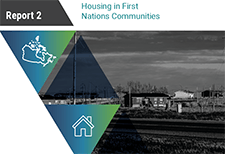Discover financial empowerment resources
Discover financial empowerment resources
Many people living in First Nations communities do not have access to housing that is safe and in good condition—a fundamental human right. Improving housing for First Nations is vital for their physical, mental, and economic health and well-being. This is the fourth time since 2003 that we...

Reaching Home: Canada's Homelessness Strategy is a community-based program aimed at preventing and reducing homelessness across Canada. This program provides funding to urban, Indigenous, rural and remote communities to help them address their local homelessness needs. Click "Access this resource"...

This paper explores the intersection of digital innovation, digital services, access, and taxpayer rights in the Canadian context, in light of the experiences of vulnerable populations in Canada, from the perspective of the Taxpayers’ Ombudsman. Many aspects of the CRA’s digitalization...
Comprehensive research on microfinance and subsidy shows that virtually all microfinance institutions are subsidized, but these subsidies are small. There are two clear paths for increasing microcredit’s impact through continued investment: » Lowering the cost of microcredit by lowering...
This second edition of Canadian Demographics at a Glance updates and expands the data and analyses found in the first edition. This compendium is comprised of four sections, beginning in Section one with an overview of Canada’s total population growth, as well as the age and sex structure....
This report analyzes federal spending on elementary and secondary education for students living on First Nations reserves. It examines the evolution of spending over the past decade and analyzes how funds were allocated and how these allocations compared to the provinces. It also provides forward...
Most rural Native VITA sites, unlike urban VITA sites, face a unique set of challenges. The geographic isolation, low volunteer retention rates, economically distressed communities, and overall distrust of the federal government among many Native Americans can limit the success of traditional...
Volunteer Income Tax Assistance (VITA) sites are a useful tool for providing free tax preparation services to low-to-moderate income people and helping them claim a range of valuable tax credits, including the Earned Income Tax Credit. In addition, they can help individuals avoid high fees for tax...
In the spirit of social justice, the Commission on Social Determinants of Health was set up by the World Health Organization (WHO) in 2005 to marshal the evidence on what can be done to promote health equity, and to foster a global movement to achieve it. The Commission calls on the WHO and all...
Aboriginal individuals, entrepreneurs and communities have been affected by financial literacy challenges in many of the same ways that lower-income people and remote populations in Canada have. However, there is the additional weight of specific cultural and structural barriers and the additional...
This short guide explains what rights customers have when a financial institution closes a branch. When a financial institution is planning to close a branch, it must provide proper notice to its customers in order to minimize any inconvenience. To give consumers and communities time to find other...
We experimentally test the impact of expanding access to basic bank accounts in Uganda, Malawi, and Chile. Over two years, 17%, 10%, and 3% of treatment individuals made five or more deposits, respectively. Average monthly deposits for them were at the 79th, 91st, and 96th percentiles of baseline...
This brief overview of the financial literacy needs of Aboriginal peoples was generated through consultations with experts in the field and insights shared by TD Financial Literacy Grant Fund recipients. Its aim is to share knowledge with ABLE Financial Empowerment Conference participants to inform...
Assigned the task of studying social conditions in Canadian cities, the Standing Senate Committee on Social Affairs, Science and Technology‘s Subcommittee on Cities chose to begin with people whose lives in those cities are marginalized by poverty, housing challenges and even homelessness. The...
In 2013, AFOA Canada conducted an international Literature Review of Indigenous Financial Literacy entitled: Literature Review of Indigenous Financial Literacy in Australia, Canada, New Zealand and the United States, December 20, 2013. One of the recommendations in the Literature Review was to...
